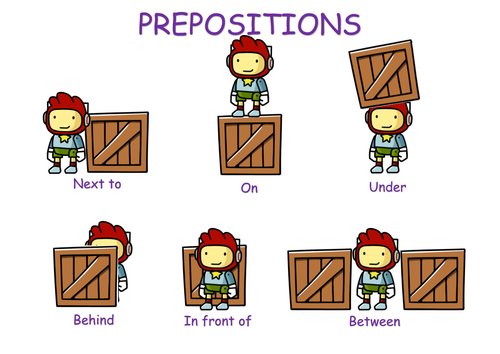
- Sự lựa chọn giới từ trong một mệnh đề thường phụ thuộc vào tính từ, động từ hoặc danh từ đứng trước nó.
1. V + GIỚI TỪ (V + PREPOSITION)
| Verb | Preposition |
|
care, complain, hear, know, learn, say something, talk, think, warn, wonder, worry, write |
about |
|
aim, fire, laugh, look, point, shout, yell |
at |
|
choose, decide, differentiate, distinguish |
between |
|
aim, apologise, apply, forgive, hope, long prepare, search, wait, watch, wish |
for |
|
learn, prevent, stop |
from |
|
assure, convince |
of |
|
concentrate, count, depend, insist, rely |
on |
|
apologise, explain, present, speak, talk, write |
to |
|
be, deal, go out, play, stay |
with |
► NOTE: Chúng ta KHÔNG sử dụng giới từ với động từ marry:
ex: She married him last year. (not She married with him last year)
- Các động từ chỉ lời nói hoặc suy nghĩ (ví dụ: complain, know, learn, say something, talk, think, warn somebody, wonder, write) thường được theo sau bởi about khi chúng ta muốn trình bày chủ đề:
ex: That way you can learn about teaching before being asked to do it.
► NOTE: Một số động từ chỉ lời nói hoặc suy nghĩ khác (ví dụ: discuss, debate, consider, mention) không cần giới từ:
ex: We need to discuss the problem. (not discuss about)
- Một số động từ chỉ lời nói (ví dụ: apologise, explain, present, speak, talk, write) thường được theo sau bởi to + person để cho biết ai là người bài phát biểu hướng đến:
ex: Have you talked to anyone who has done this course?
- Chúng ta sử dụng at + person / thing sau một số động từ (ví dụ: aim, fire, laugh, look, point, shout, yell) để chỉ ra ai hoặc cái gì là trọng tâm của động từ:
ex: If they shout at me in class, I'm not sure what I'll do.
- Chúng ta thường sử dụng for sau các động từ thể hiện mong muốn (ví dụ: aim, hope, long, wish) để giới thiệu thứ chúng ta muốn:
ex: I'm aiming for a good mark in my next assignment.
► NOTE: Chúng ta sử dụng to sau các động từ như: aim, hope và long nếu chúng được theo sau bởi một động từ:
ex: I'm hoping to get a better mark than last year.
2. TÍNH TỪ + GIỚI TỪ (ADJECTIVE + PREPOSITION)
| Verb | Preposition |
|
anxious, annoyed, concerned, depressed, excited, upset, worried |
about |
|
amazed, annoyed, astonished, awful, bad, clever, excited, good, skilled, surprised, terrible, useless |
at |
|
amazed, annoyed, astonished, concerned, disturbed, excited, impressed, inspired, shocked, surprised |
by |
|
bad, concerned, good, responsible |
for |
|
disappointed, interested |
in |
|
frightened, scared, terrified |
of |
|
aware, clever, cruel, generous, good, kind, mean, nasty, nice, polite, rude, selfish, true, typical, unkind |
of |
|
cruel, good, kind, mean, nasty, nice, polite, rude, unkind |
to |
|
annoyed, bored, concerned, disappointed, fed up, impressed, obsessed, pleased, satisfied, wrong |
with |
- Tính từ nói về khả năng (ví dụ: awful, bad, clever, good, skilled, terrible, useless) thường được theo sau bởi at:
ex: I’m not very good at maths.
- Một số tính từ miêu tả nỗi sợ hãi (ví dụ: frightened, scared, terrified) có thể được theo sau bởi of:
ex1: There are some aspects of the course that I am a bit scared of.
ex2: Most people are frightened of being in front of a class for the first time.
- Tính từ miêu tả hành vi (ví dụ: clever, generous, good, kind, nice, selfish) trong một mệnh đề bắt đầu bằng it, that hoặc this thường được theo sau bởi of:
ex: - Would you like a cup of tea or coffee? - That's very kind of you.
- Tính từ miêu tả hành vi hướng tới người khác (ví dụ: cruel, good, kind, mean, nasty, nice, polite, rude, unkind) thường được theo sau bởi to:
ex: I'm worried about the pupils being rude to me.

3. DANH TỪ + GIỚI TỪ (NOUN + PREPOSITION)
| Noun | Preposition |
| anything, information, nothing, something | about |
| excuse, explanation, ideas, in return, need, reasons, reputation, responsibility | for |
| change, decrease, drop, experience, fall, increase, rise | in |
| experience, knowledge, understanding | of |
| effect, impact, influence | ơn |
| in association, experience | with |
4. CỤM GIỚI TỪ: by, in, at, on, of (PREPOSITIONAL PHRASES: by, in, at, on, of)
4.1. by
- Chúng ta sử dụng by:
+ Để nói về một ai đó trong mệnh đề bị động:
ex: But you will be taught how to deal with those things by the tutors on the course.
+ Để giải thích cách thực hiện một cái gì đó:
ex: You can remove any dirty marks by wiping it with a wet cloth.
+ Để nói về giao thông vận tải và truyền thông (ví dụ: by plane, by email):
ex: We'll be in touch by email soon if that's okay.
+ Để nói về cơ hội (ví dụ: by chance, by accident, by mistake):
ex: I saw the advertisement for the job by chance and decided to apply for it.
4.2. in
- Chúng ta sử dụng in cho các biểu hiện sau: in love, in pain, in private, in touch, in debt, in danger, in a rush, in fashion, in luck, in the end.
ex: Don't forget to keep in touch while you're away!
4.3. at
- Chúng ta sử dụng at cho các biểu hiện sau:
+ at first, at large, at peace:
ex: At first I was impressed by the reputation of the university but I also like the course you offer.
+ at work, at home, at school, at the airport, at university:
ex: I've just finished my first degree at Stamford University.
4.3. on
- Chúng ta sử dụng on để nói tại sao bạn ở đâu đó (ví dụ: on holiday, on business, on duty):
ex: I want to go to the mountain on holiday.
4.4. of
- Chúng tôi sử dụng of với biểu thức số lượng (ví dụ: all, any, both, either, neither):
ex: All of us love traveling.

NGỮ PHÁP BỔ SUNG: CÁC GIỚI TỪ |
- Chúng ta có thể sử dụng các danh từ, đại từ hoặc -ing sau một giới từ:
ex1: I was really impressed with the description of the course in your prospectus.
ex2: If they shout at me in class, I'm not sure what I'll do.
ex3: Well, I've always been interested in teaching.
- Trong câu phủ định, not đứng giữa giới từ và -ing:
ex: I'm worried about not being able to control a class.








